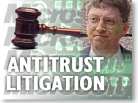|
Microsoft denies sabotage
|
 |
February 18, 1999: 3:53 p.m. ET
Witness says Apple was responsible for problems with QuickTime software
|
NEW YORK (CNNfn) - A Microsoft Corp. executive rebutted government allegations that the software giant intentionally sabotaged multimedia software from Apple Computer Inc. as part of a broader campaign to bully the company, according to documents released Thursday.
The Justice Department and 19 states contend Microsoft (MSFT) frequently uses its monopoly power with the Windows operating system as a weapon to coerce companies to use its products over competitors' offerings.
Previously, Avadis Tevanian, Apple (AAPL) senior vice president of software engineering, testified that Microsoft attempted to sabotage the company's QuickTime video software to apply pressure on Apple.
Microsoft, the government charged, wanted Apple to use Internet Explorer as the default Web browser on Apple's MacOS operating system instead of Netscape Communications Corp. 's (NSCP) Navigator.
But Eric Engstrom, general manager of the Web essentials division for the Microsoft Network (MSN) online service, said Apple's allegations were untrue, and that any problems related to QuickTime for Windows stemmed from errors in Apple's software.
"Avie Tevanian's testimony is based on misinformation, a mischaracterization of the way technical issues arise in software development and normally are addressed, and an inadequate investigation into the bases for his inflammatory accusations," Engstrom said.
"Not surprisingly, therefore, independent third parties have confirmed the error of Avie Tevanian's testimony: Apple, not Microsoft, is the cause of the problem."
No coercion involved
Engstrom also responded to charges that Microsoft attempted to force Apple to concede the multimedia playback market to Microsoft, which echoed the government's allegation that Microsoft tried to divide the Web browser market with Netscape.
"Microsoft did not tell Apple to 'kill' or abandon its QuickTime for Windows technology," said Engstrom, who characterized a series of 1998 meetings with the company as routine and pro-competitive.
"Our discussions with Apple about possible areas of technical cooperation in the development of multimedia software were no different than other communications that commonly take place in the computer industry," Engstrom said.
"Contrary to Avie Tevanian's assertion, we did not seek to stifle competition, but rather to remove the technological impediments to innovation and competition in areas that would benefit consumers."
Engstrom is the second Microsoft executive this week to rebut allegations that the company bullied another firm to gain market share for its Web browser.
In testimony released Wednesday, Daniel Rosen, Microsoft general manager of new technology, denied the company attempted to coerce Netscape to cede the Windows browser market in exchange for server-based products.
Engstrom did not, however, respond to Tevanian's charges that Microsoft also threatened to remove support for Microsoft Office for Macintosh -- a product critical to Apple's business -- unless Apple resolved a patent dispute.
In 1997, Apple was involved in a dispute with Microsoft in which it claimed the Windows operating system and Internet Explorer browser infringed on Apple patents.
Engstrom will take the stand after the government finishes its cross examination of Rosen.
Compaq feared Microsoft
During Thursday's court session, government lawyers disclosed that No. 1 computer maker Compaq Computer Corp. (CPQ), which has a close working relationship with Microsoft, was worried by the software giant's "improper use of a monopoly position," according to a Compaq memo released in court.
Portions of the memo -- and documents expressing fear about what retaliation Microsoft might take if Compaq worked with other software makers -- were introduced at Microsoft's antitrust trial.
Compaq the world's biggest personal-computer maker, loads Microsoft software on its products and has publicly defended Microsoft against some of the government antitrust charges.
The memos revealed a frustration Compaq's employees felt when they tried to deal with other software companies, such as Netscape and Go Corp.
In a Nov. 12, 1996, memo, Compaq employee Bob Friedman noted that Microsoft was unhappy that a Netscape icon appeared on the desktop screen of some Compaq personal computers.
"Microsoft's stance to date raises questions of improper use of a monopoly position," Friedman wrote.
In 1993, slides prepared for a Compaq meeting speculated on what Microsoft might do if Compaq chose to use software from the Go Corp. for use in handheld devices.
Compaq listed "potential reactions" by Microsoft, among them the possibility that Microsoft might "sabotage our efforts" by using Windows 95, then in development, to "break" some of Compaq's software. Compaq also feared that Microsoft would withhold information on Windows 95 from Compaq.
But the slide concluded that the risk of retaliation from Microsoft was "manageable." In the end, however, Compaq decided not to work with Go.
The memos became public during the cross-examination by the government of John Rose, senior vice president and general manager of Compaq's enterprise computing group. Rose testified that Compaq now enjoys cut-rate prices for Windows.
Trial to meet Friday
At the opening of Thursday's session, U.S. District Judge Thomas Penfield Jackson announced that the trial would meet on Friday for the first time in its 16 weeks. That will lead up to an expected recess in March and part of April.
Jackson told lawyers on Feb. 8 that he was "very anxious to conclude the presentation" of the main witnesses.
Rose was the 20th of 24 witnesses. Four rebuttal witnesses will be heard after the break.
The trial, in its 56th day, has been running since Oct. 19, 1998.
Microsoft shares fell 4-7/16 at 145-9/16 in Thursday trade. 
-- from staff and wire reports
|
|
|
|
|
|
Microsoft
|
Note: Pages will open in a new browser window
External sites are not endorsed by CNNmoney
|
|
|
|
 |

|

